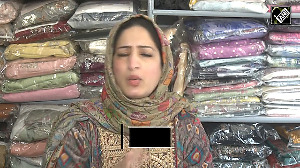Food security in India, something that we had come to take for granted, is under serious threat. Long term plans to address the malaise are not in place as the problem itself is not acknowledged.
Last year, we began importing wheat after a six-year hiatus. We imported 5.5 million tonnes last year and this year are likely to do an encore. The supply side shortage has come to stay and unless drastic steps are taken to improve productivity, things could only deteriorate.
Prices have naturally soared. Wheat, which used to trade at Rs 700 a tonne at this time last year, now goes at Rs 1,100. Prices of other agri-products like pulses and maize have also gone up during the last three years.
How delicate the situation is can be gauged from the fact that the government had to blatantly warn large traders not to buy wheat from the market. But how can you know, whether the "adhti" in the Khanna mandi is operating on behalf of Cargill or procuring for the jawans in Kargil. The export of the kernel has been banned.
While the population continues to rise, the acreage under agriculture continues to slide. We may, in fact, become net importers of food products again. Currently, we export cereals, coffee, tea, spices and cotton, which accounts for a lion's share of agri-exports.
Then we must remember that we have had the good fortune of having 13 above-normal monsoons in a row, though the same can't be said of their distribution.
Each passing year, we increase the probability of a bad monsoon. Scanty precipitation in one year could make us a net importer rather than a net exporter of food items.
Last year we had a net food surplus of around Rs 29,000 crore (Rs 290 billion) against a trade deficit of Rs 2,00,000 crore (Rs 2,000 billion) approximately. The year we turn net importer, it could adversely effect our currency, though the relationship is not as linear as one would think.
A currency devaluation may take its toll, as we could pay more for our fuel imports, even if crude remains where it is.
With this background and elections looming large on the horizon in the key state of Uttar Pradesh, the coming budget is likely to focus on fighting inflation. The recent move of pruning the central sales tax from 4 to 3 per cent demonstrates that the government will try and tackle inflation.
So do not be perturbed if you see more stress on farmers, food and fertilisers in this year's Budget speech.
Approach the Budget with an open mind and consider it like any other policy announcement. The FMs, over the years, have de-glamourised the Budget and there are more policy announcements outside that precede or succeed it.
The reduction in customs duty on cement and steel, for instance, which would normally have been a part of the budgetary speech, were announced earlier. More policy decisions could follow after the Budget.
I always advise retail investors not to second-guess the finance minister. The devil in the fine print will not show up before the markets close. This is a day when traders can relax at home rather than lose money on every little move the markets make to words and even pauses that the FM takes to read his speech.
As the news gets immediately discounted, do not buy stocks that receive favourable treatment from the Budget or sell those that receive the boot. Your take on the financial results and performance of the companies should be the only driving factor.







 © 2025
© 2025